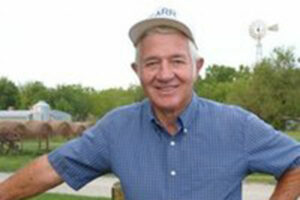Topic: Agricultural economics

Interview of Lon Frahm, June 18, 2020
Interviewed by Rex Buchanan
In this 2020 oral history interview, Lon Frahm describes his involvement in groundwater policy development as a member of Northwest Groundwater Management District No. 4. During the 1990s, he challenged the zero-depletion policy (to take only the amount of water that will be naturally replenished). Frahm supported local control of water management. He observed that over the years control over water planning has shifted to state-level water agencies, particularly the Kansas Water Office, that are not “invested personally” in managing water in northwest Kansas. In his view, state Water Plan funding has resulted in spending that Show Moredoes not help farmers and other local interests. Frahm cites the importance of local culture in setting water policy using as an example the Local Enhanced Management District (LEMA) in Sheridan County. He notes that the success of that endeavor grew out of the shared values of the farmers and a local market for grain. Frahm argues that changes in water use will be very slow over time, and water use should not be held back because we cannot predict the future. Show Less

Interview of Gerald (Jerry) Karr, May 11, 2017
Interviewed by Janice Huston
This interview of Senator Jerry Karr by Janice Huston for the Lyon County Historical Society is lengthy, but gives great insight into the 18 years Karr spent in the Kansas Senate. It also covers his academic career which preceded his election and delves into rural life in Kansas. It begins with his Sierra Leone experiences teaching agricultural economics and other teaching jobs in the Midwest. Karr was elected to the state Senate in 1980 which is the time the farm crisis started boiling over in Kansas. During those first 10 years he developed legislation addressing Show Morethe farm crisis, including changing the method of selecting the Secretary of Agriculture, altering the classification and reappraisal of land, and regulating corporate hog farming. His service on the Joint Rules and Regulations Administrative committee helped him shape agricultural policy. He became Minority Leader ten years after his first election. Redistricting in 1991 ended up in the courts and spelled the end of many rural Democrats. There are numerous examples of policy making, particularly the details about the 1992 school finance legislation that amplify others’ accounts of that legislation. His examples of effective leadership and effective campaigning will be of interest to many. The interview also covers communication with constituents in a large district and has anecdotes about issues leaders have to deal with. Karr covers just about all aspects of leading a caucus and life in the Senate in the 1980s and 1990s. Show Less
